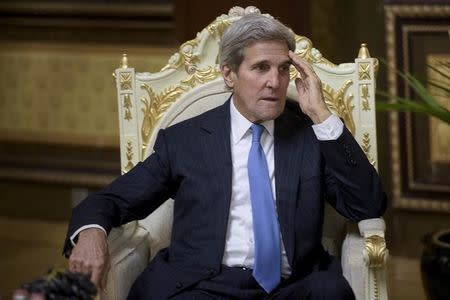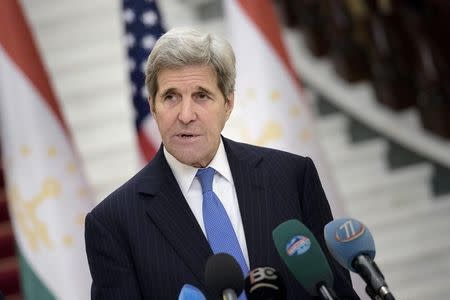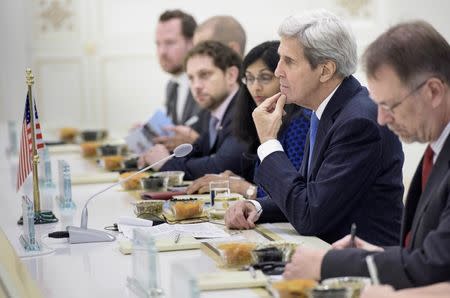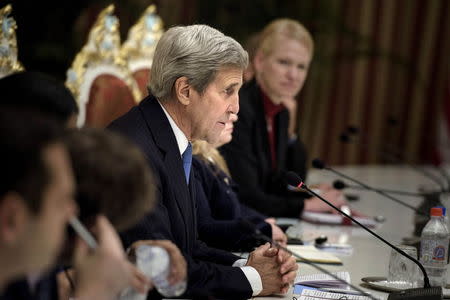Kerry reassures Afghanistan's neighbors, urges against govt crackdowns
By Matt Spetalnick ASHGABAT, Turkmenistan (Reuters) - U.S. Secretary of State John Kerry assured the rulers of Tajikistan and Turkmenistan on Tuesday of U.S. support for Central Asian security against the spread of Islamic militancy from neighboring Afghanistan but urged them not to overreact in crackdowns on political Islam at home. Wrapping up a tour of the strategic region, Kerry tried to allay concerns of the two countries, which share long borders with Afghanistan, that they will be forgotten as Washington draws down forces there at a time when Russia is reasserting itself in Central Asia. The trip to all five of Central Asia's ex-Soviet republics was meant to show that the United States intends to stay engaged and wants to deepen economic as well as security ties. But while Kerry was given the red carpet treatment, the diplomatic niceties failed to translate into any major tangible achievements from the highest-level U.S. visit in years. What Kerry did experience, however, was a series of sometimes awkward encounters with long-ruling autocrats who tolerate little dissent and in some cases cultivate idiosyncratic cults of personality. Kerry met Tajik President Imomali Rakhmon in Dushanbe and Turkmen President Kurbanguly Berdymukhamedov in Ashgabat on Tuesday. Both countries fear the spread of Islamist militancy and Kerry offered to help them beef up border security. But he also told them that repression of political opponents could backfire and breed radicalism. Speaking after talks with Rakhmon, Kerry said counterterrorism should be conducted "in a way that balances human rights, religious freedom" and political participation. During his four-day tour, Kerry nudged leaders for progress on human rights, holding out the promise it would mean greater U.S. cooperation on other fronts, but there was no sign that he threatened any real consequences for failing to act. Kerry, for example, raised with Turkmenistan’s president a desire to work with him for the release of 87 people designated “prisoners of concern,” a senior U.S. official said. The leader, whose portraits hang on the facades of government buildings and who recently unveiled a huge statue of himself atop a golden horse, was non-committal. “What he said was, well, these are technical issues and that we need to have conversations with the experts,” the official said. At the same time, U.S. officials said Central Asian leaders were supportive of President Barack Obama’s decision last month to slow the pace of U.S. withdrawal from Afghanistan, meant in part to show neighbors that Washington was not abandoning them. But a second senior U.S. official said most of the leaders of the region’s countries, all majority Muslim, could not be “openly effusive” about the presence of U.S. troops near their borders and instead could only praise the move in private. U.S. officials are especially concerned about the Tajik government’s response to the Islamist threat. It has banned an Islamist political party, and last month authorities arrested almost two dozen of its members. Kerry raised the matter with Rakhmon on Tuesday, one official said. A senior U.S. official also noted that men with the traditional long beards of devout Muslims have faced "particular persecution" in Tajikistan. The apparent defection this year of a police chief to the Islamic State militant group has unnerved Tajik authorities. Tajikistan hosts a Russian military base and a senior Russian official said last month Moscow could re-establish security operations to guard the Tajik-Afghan border. MORE INDEPENDENT Like Tajikistan, Turkmenistan’s rights record is widely criticized. Rights groups list it among the world's most repressive and isolated countries, sometimes drawing comparisons to North Korea. Berdymukhamedov has run the country with an iron grip since taking over in 2006. But he has also taken a course more independent of Moscow, opening the way to be courted by the United States. Kerry, the first U.S. secretary of state to visit Turkmenistan since James Baker in 1992, said after talks they had discussed the "human dimension," a diplomatic code phrase he has used during the trip that his aides say encompasses human rights. He also said Ashgabat and Washington would sign a memorandum of understanding on "strategic security". Kerry’s trip to Central Asia followed warnings from Russian officials about the danger of Islamist militants infiltrating the region from Afghanistan, accompanied by hints Moscow could respond by beefing up its military presence. Though Russian officials say they are driven only by concern about militants, not geopolitical rivalry, their heightened attention risks fuelling U.S. suspicions of Moscow's intentions. Despite that, U.S. officials insisted they were not trying to push Central Asia to make a choice between the United State or Russia but instead wanted them to have good relations with Moscow. It remains to be seen, however, whether the U.S. outreach might give those countries more leverage in their dealings with Russia. (Additional reporting by Olzhas Auyezov in Almaty; Editing by Giles Elgood and James Dalgleish)





